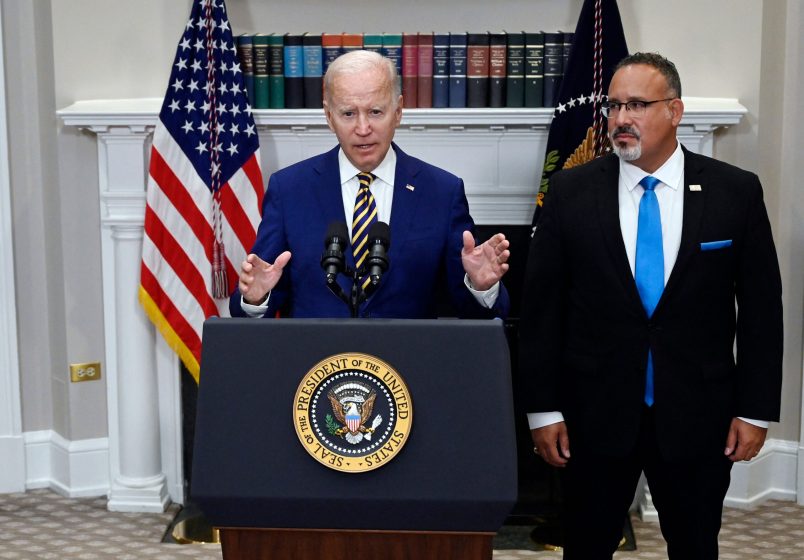The Supreme Court’s right-wing majority rejected President Joe Biden’s student loan debt relief plan Friday, using an in-vogue right-wing “doctrine” to help do so.
“The HEROES Act allows the Secretary to ‘waive or modify’ existing statutory or regulatory provisions applicable to financial assistance programs under the Education Act, but does not allow the Secretary to rewrite that statute to the extent of canceling $430 billion of student loan principal,” Chief Justice John Roberts writes for the majority.
The decision is a six-three split, with Justice Elena Kagan writing the dissent for the liberals. Justice Amy Coney Barrett also wrote a concurring opinion.
Roberts employs a “major questions” argument, a faddish right-wing legal theory that nixes usual court deference to executive branch agency actions when those actions are of large “economic and political significance.” Conveniently for the right-wing justices, what actions pass that threshold of significance is completely subjective.
“The ‘economic and political significance’ of the Secretary’s action is staggering,” Roberts insists.
The majority rests the crux of its argument on the assertion that the Education Secretary is only allowed to “waive or modify” student loan programs (as Kagan points out, with near sole emphasis on the word “modify”), and that the Biden administration’s relief goes too far beyond those definitions.
“The Secretary’s plan has ‘modified’ the cited provisions only in the same sense that ‘the French Revolution ‘modified’ the status of the French nobility’—it has abolished them and supplanted them with a new regime entirely,” Roberts writes with a flourish.
Kagan takes on the major questions argument in her dissent, pointing out that the Supreme Court is actually appropriating massive power to itself when it decides that agencies can’t act in line with what congressional statutes allow them to do.
“The result here is that the Court substitutes itself for Congress and the Executive Branch in making national policy about student-loan forgiveness,” she writes.
She also points out the truly bizarre theory of standing on which the case rests. The “injury” allowing the state of Missouri to bring the case is to the Missouri Higher Education Loan Authority — a completely independent entity from the state, which has not joined in the case in any way.
“In adjudicating Missouri’s claim, the majority reaches out to decide a matter it has no business deciding,” Kagan writes. “It blows through a constitutional guardrail intended to keep courts acting like courts.”
She questions how the extended repayment pause under then-President Donald Trump — which “offered a significant new benefit, and to an even greater number of borrowers” — did not run afoul of the major questions doctrine, but Biden’s plan does.
Barrett spends her concurrence insisting that the major questions doctrine — which Kagan dismisses as “made up” — can be used in line with a textualist reading of the congressional statutes at hand.
The Court also rejected a separate challenge to the debt relief plan Friday, finding that the respondents lacked standing.
Read the opinion here:







The next ProPublica drop, I hope is anytime now.
In case anyone still needs reminding, these terrible Supreme Court decisions on religious-based discrimination against abortion and same-sex marriage, on affirmative action, the EPA and the legitimacy of government agencies, and student loan forgiveness are coming down for one and only one reason:
Hillary lost.
Well, at least a solid talking point for re-election.
Remember when the Repubs condemned legislating from the bench?? This is grotesque!!